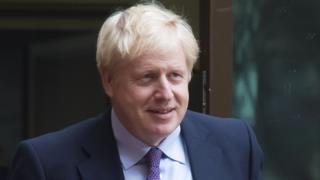Boris Johnson announces £1.8bn one-off cash boost for NHS hospitals
 Image copyright Getty Images
Image copyright Getty Images Prime Minister Boris Johnson has announced a one-off cash boost of £1.8bn for NHS hospitals in England.
The amount – less than 1% of NHS England’s annual budget – will be available immediately to go towards new equipment and upgrades to 20 hospitals.
Writing in the Sunday Times, Mr Johnson said he was “determined to deliver” the promises of the Brexit referendum campaign and increase NHS spending.
But Labour said it fell “significantly short” of the amount needed by the NHS.
The money is coming from the Treasury and is not a re-allocation of funds from the Department of Health.
It is on top of the cash boost announced by former prime minister Theresa May last year – an extra £20bn a year by 2023.
Around £850m – spread over five years – will go towards funding the 20 hospital upgrades that Mr Johnson promised in his first speech as PM outside Downing Street.
The remaining money is expected to help clear a backlog of existing upgrade work and infrastructure projects.
He will formally announce the funding on Monday, when he is expected to identify the hospitals which will get money to upgrade wards and repair buildings.
But the health think tank the Nuffield Trust said the latest funding would “only be a fraction of what it would cost to really upgrade 20 hospitals”.
Nigel Edwards, the Nuffield Trust’s chief executive, added that it it was a “down payment on the staggering £6bn needed to clear the backlog” of NHS maintenance.
However, he said it was encouraging to see money put towards capital funding – used for equipment and repairs – “which will help stop hospitals deteriorating even further”.
In October, NHS Digital figures showed that NHS trusts had a backlog of around £6bn of repairs or replacements that needed carrying out.
‘A small step forward’
The NHS in England can hardly do anything other than welcome new money from the Treasury to invest in hospital buildings and launch new construction projects.
But the £1bn this year to clear the backlog should be set against a total of £6bn which hospital leaders and think tanks believe is the total of work outstanding, including repairs and refurbishment of dilapidated facilities.
On top of that is £850m for 20 hospitals to carry out major upgrades, but spread over five years.
The latest announcement covers capital spending as opposed to day-to-day running costs.
After raids on these capital budgets to prop up NHS frontline services in recent years, health service staff will feel there is some way to go to make up the lost ground – and only a small step forward has been taken.
If you can’t see the NHS Tracker, click or tap here.
Writing in the Sunday Times, Mr Johnson praised the “astonishing achievements” of the NHS, but highlighted the staffing pressures, along with the delays and cancellations facing patients.
“Which is why I am so determined to deliver now on the promises of that 2016 referendum campaign: not just to honour the will of the people, but to increase the cash available for this amazing national institution,” he said.
In the run-up to the Brexit referendum, a campaign bus used by Vote Leave claimed the UK sent £350m a week to the European Union and suggested the money could instead be spent on the NHS.
Mr Johnson wrote: “It is thanks to this country’s strong economic performance that we are now able to announce £1.8bn more for the NHS to buy vital new kit and confirm new upgrades for 20 hospitals across the country.”
He said the government was also starting work on plans to “tackle the injustice” of social care – a problem “that has been shirked for decades”.
The PM added that Health Secretary Matt Hancock and Chancellor Sajid Javid had already met the head of NHS England, Simon Stevens, as they wanted to ensure “the cash gets through to the right places”.
Writing in the Sun on Sunday, Mr Hancock said the money would boost hospitals across the country – from Cornwall to Newcastle – by providing new intensive care wards, children’s units, and new mental health facilities.
He wrote the “upgrades are just the start”, saying they wanted to take a more “strategic” approach to capital spending, and move away from “piecemeal and uncoordinated” decisions.
There are also expected to be extra funding settlements for Scotland, Wales and Northern Ireland, as part of the Barnett formula – which is used to decide how much devolved governments will receive when funding is increased in areas such as health and education in England.
Around £115bn was spent on the NHS England budget last year.
Responding to the funding announcement, shadow health secretary Jonathan Ashworth said the £1.8bn pledged “falls significantly short of what’s needed to provide quality, safe care to patients after years of Tory cuts”.
He added: “Tory ministers have repeatedly cut capital investment budgets in recent years. These smash-and-grab raids have meant over £4bn slashed and seen the NHS repair bill spiral to £6bn, putting patient safety seriously at risk.”
Liberal Democrat health spokeswoman Baroness Jolly said Mr Johnson’s pledge “will not be worth the paper it’s written on” if and when a no-deal Brexit takes place.
Cancer Research UK said the investment would go “some way to address the immense strain” the NHS is under but said the staffing shortage was a priority.
Policy director Emma Greenwood added: “Upgrades to hospitals are welcome but the NHS is experiencing a staffing crisis. And it’s impossible to diagnose more cancers at an early stage without the right staff.”

